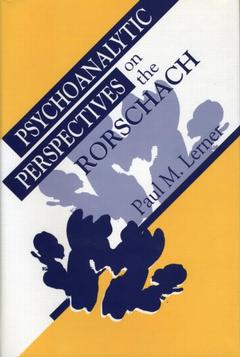Psychoanalytic Perspectives on the Rorschach
Auteur : Lerner Paul M.

Few books illuminate a domain of clinical inquiry as superbly as Psychoanalytic Perspectives on the Rorschach. Paul Lerner has written a comprehensive text that offers a richly detailed, multidimensional vision of the Rorschach as the ideal medium for operationalizing, testing, and in some instances transforming contemporary clinical theory.
For psychoanalytic therapists, the book provides a fascinating overview of how the coevolution of psychoanalytic theory and Rorschach technique has created new possibilities for conceptual integration. Lerner explores recent advances in our ability to operationalize such clinical concepts as splitting, dissociation, and false-self organization. He then reviews how these advances have been applied to research into psychic organization across different diagnostic categories, including anorexia and bulimia, aggressive and psychopathic personality, and schizotypal disorders. Finally, Lerner shows how the resulting data offer a unique vantage point from which to clarify such critical topics as developmental object relations and the structure of primitive experience.
Rorschach scholars will appreciate Lerner's informed discussions of theorists as diverse as Rapaport and Schachtel, Exner and Mayman, Schafer and Leichtman. Rorschach students, for their part, will find the book an unusually lucid introduction to test administration, scoring, interpretation, and report writing. Even here, however, Lerner's breadth and originality are apparent, for his exposition of these testing fundamentals incorporates fresh discussions of the nature of the Rorschach test, the impact of the patient-examiner relationship, and the value of the test in treatment planning. Timely, definitive, and uniquely integrative, Psychoanalytic Perspectives on the Rorschach will be valued by students, clinicians, and researchers well into the next century.
Introduction. Part I: Clinical Applications. An Experiential Psychoanalytic Approach. The Nature of the Rorschach Task. The Psychological Test Report. Psychoanalytic Diagnostic Scheme. The Rorschach Assessment Frame. Administration and Scoring. The Patient-Examiner Relationship. Major Scores: The Dimensions of the Rorschach. The Fifth Scoring Category. Specific Scores and Their Meaning. The Analysis of Content. The Analysis of Sequence. Two Approaches to Interpretation. The Inference Process. Rorschach Assessment and Treatment Planning. Part II: Research Applications. The Rorschach Assessment of Object Representations. Rorschach Assessment of Defense I: Traditional Measures. Rorschach Assessment of Defense II: Recent Measures. Dissociation: Theoretical and Assessment Considerations. Developmental Object Relations. Rapaport's Deviant Verbalization Scores and Research. The Borderline Concept and the Rorschach Test. Variants of the Borderline Concept and the Rorschach Test. Rorschach Measures of Narcissism and the Narcissistic Patient. The Rorschach and Assessing Treatment Outcome. Toward an Integrated Rorschach Approach.
Paul M. Lerner, Ed.D., psychoanalyst and psychologist, is an award-winning Rorschach researcher and past President of the Society for Personality Assessment. The author of Psychoanalytic Theory and the Rorschach (Analytic Press, 1991), he is currently in private practice in Camden, ME.
Date de parution : 05-1998
15.2x22.9 cm
Date de parution : 06-2014
15.2x22.9 cm
Disponible chez l'éditeur (délai d'approvisionnement : 14 jours).
Prix indicatif 64,97 €
Ajouter au panierThème de Psychoanalytic Perspectives on the Rorschach :
Mots-clés :
test; record; patient; examiner; relationship; assessment; protocols; projective; identification; object; American Psychiatric Association; Lerner Defense Scale; Fabulized Combination; Patient Examiner Relationship; Rorschach Records; Boundary Disturbance; Low Level Denial; Inpatient Borderlines; Rorschach Protocols; Rorschach Scales; Bulimic Anorexics; Restrictive Anorexics; Rorschach Assessment; Narcissistic Patients; Deviant Verbalizations; Outpatient Borderlines; Eating Disorder Patients; Form Level Ratings; Ballet Students; Rorschach Indices; Rorschach Response; Menninger Psychotherapy Research Project; Young Man; Borderline Patients; Assessment Frame



